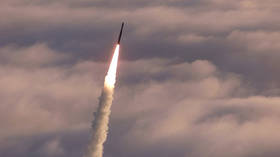Faulty sensors & inadequate pilot training: Ethiopia issues damning report on Boeing 737 MAX crash
A report into the crash of a Boeing 737 MAX 8 jet which killed 157 people in Ethiopia last year criticized Boeing for offering “inadequate” training for pilots flying the new model aircraft.
The interim report by the Ethiopian government found faulty readings from sensors and the activation of the MCAS anti-stall system preceded the Ethiopian Airlines crash.
Planes of this type have two sensors recording the plane's angle, known as the angle of attack (AOA). One of them malfunctioned shortly after liftoff and registered a reading of a whopping 74.5 degrees, prompting MCAS activation, the report states. The system then repeatedly forced the plane's nose downward because the sensor was reporting that it was climbing too steeply.
The preliminary report said that pilot training did not include scenarios in which the MCAS system was activated erroneously. Training should include simulator sessions to familiarize pilots with “normal and non-normal MCAS operation,” it said.
Also on rt.com Congress slams ‘fundamentally flawed’ Boeing 737 MAX & ‘grossly insufficient’ FAA in scathing reportThe report does not mention any errors made by pilots and notes that they were fully certified and medically cleared to fly.
Ethiopian Airlines Flight 302 was scheduled to travel from Addis Ababa to Nairobi, Kenya on March 10 last year. It crashed just six minutes after takeoff, becoming the deadliest ever crash for Ethiopian Airlines.
Less than six months earlier, Indonesian Lion Air flight 610 also crashed almost immediately after takeoff from Jakarta. The two tragedies claimed the lives of 346 people combined and ultimately prompted the global grounding of the 737 MAX fleet.
The investigations that followed have exposed rather questionable practices within Boeing itself, as well as a very cozy relationship between the aircraft manufacturing giant and the US air safety regulator – the Federal Aviation Administration (FAA).
On Friday, the US House Transportation Committee issued a truly devastating report on the whole 737 MAX affair, stating that the aircraft’s flights were “doomed” from the beginning. Boeing’s persistent “culture of concealment” that prioritized cost-cutting and delivering on schedule above anything else was the key element behind the 737 MAX faults. The company did its best to hide the critical issues plaguing the plane both from the FAA and its customers, as well as from pilots who flew the aircraft.
Also on rt.com Dangerous debris found inside fuel tanks of around 35 new Boeing 737 MAX jetsThe FAA is to blame for the whole affair as well, the US House said, since the watchdog “jeopardized the safety of the flying public” with its “inherent conflicts of interest.” The FAA’s review of the 737 MAX was “grossly insufficient,” while technical experts who expressed their concerns were reportedly silenced.
The 737 MAX fiasco has resulted in some 150 lawsuits from the crash victims and already inflicted heavy financial losses. The company experienced its first annual loss in over two decades, while its main competitor – Airbus – snatched a large chunk of the market. The future of the 737 MAX remains quite dim, as it is still unclear whether the company will be able to re-certify the ill-fated aircraft.
Think your friends would be interested? Share this story!














